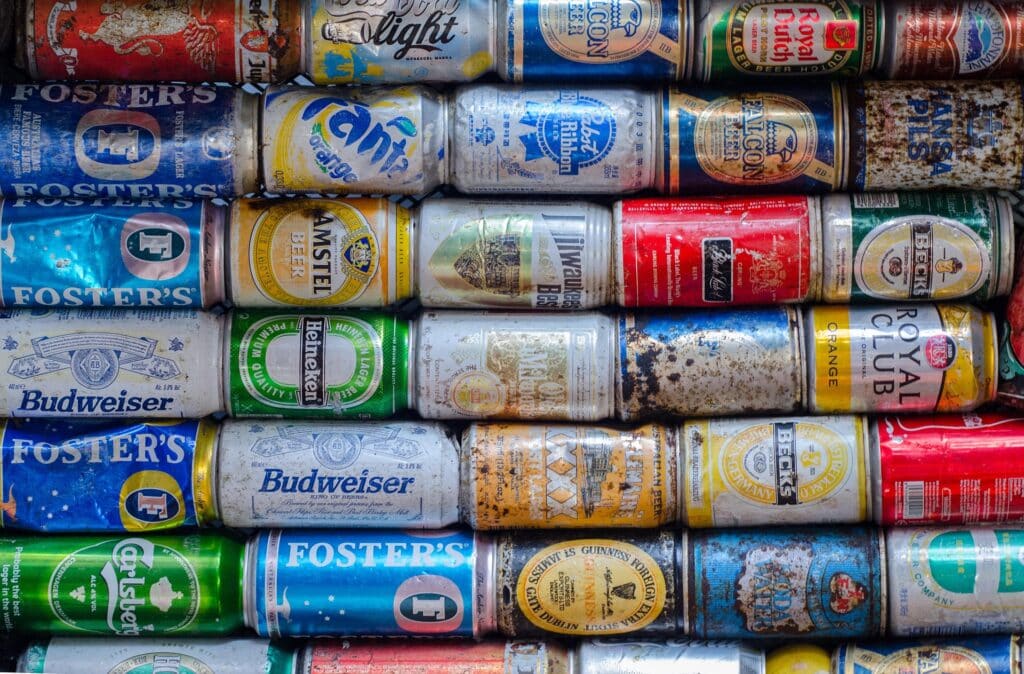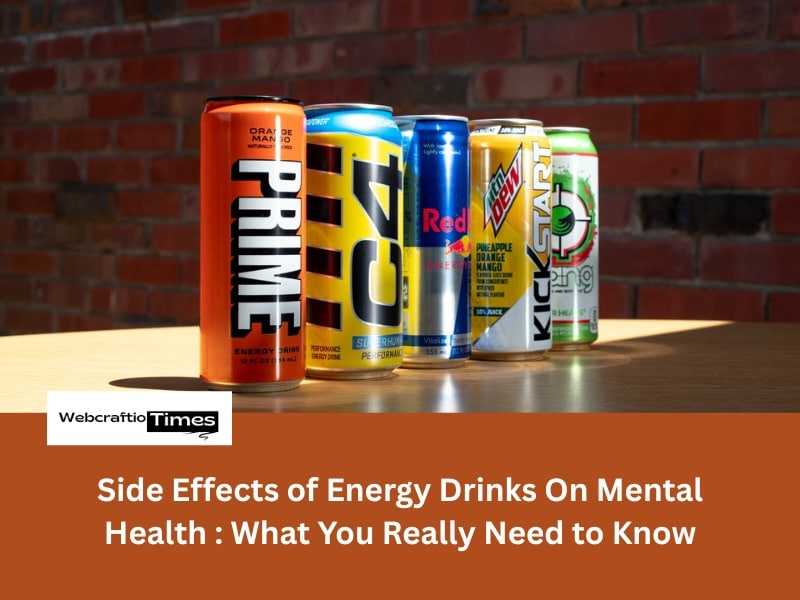Energy Drinks: More Than Just a Drink
Energy drinks became popular in the late 1900s and quickly found a spot in the market. Unlike a cup of coffee, these drinks are designed to give a stronger and longer boost of energy. They usually have much more caffeine than coffee or soda, along with sugar, B vitamins, taurine, guarana, L-carnitine, and ginseng. This mix helps people feel more awake, perform better, and fight tiredness.

At first, athletes and party-goers were the main customer, but soon students, workers, and many others started using them. Mostly ads of these energy drinks try to target the younger generation, they try to make them believe that energy drinks boost performance and give an active fresh lifestyle. But they don’t show that the same ingredients which give quick boosts are harmful for mental health and physical health. In this article we will talk in detail about side effects of energy drinks on mental health.
What are Side Effects of Energy Drinks on Mental Health ?
The fast heartbeat and shaky hands you might feel right after drinking an energy drink are obvious. But the effects on mental health can build up quietly over time. Regular use can lead to deeper problems such as anxiety, poor sleep, mood swings, and even dependence.These side effects can make anyone’s life worse.
1. Anxiety and Panic Attacks: The Overdrive Effect
Sometimes energy drinks can create so much anxiety in the person who is drinking it. For people who are already struggling with mental health issues can be affected more quickly by these drinks. They may experience panic attacks, so much depression etc. Caffeine mixed with other stimulants like guarana can affect the nervous system easily, it can make it hard to relax and focus.
2. Sleep Problems: One of The Serious Issue
We know sleep is so important for everyone, this is the only thing which makes our body relax, drinking energy drinks can affect our sleep too. Even if we sleep somehow, caffeine can affect our deep rest, leaving us feeling tired and weak. By the time less sleep can effect our mental health.This is how soft drinks effects our sleep and later they cause mental health issues.
3. Mood Swings and Depression: The Emotional Effects
Energy drinks may give us a quick boost but soon it will be over and give us bad mood swings like feeling down or weak, feeling tired and weak. These mood swings can leave us irritable and in a low mood. These changes in mood swings can make us depressed and turn us into a mental health victim. This is how energy drinks affect our mood swings and later create mental health issues in us.
Energy drinks can disrupt poor sleep quality, negatively impact mood, and lead to mental health issues like anxiety and depression… Resource: Healthline
4. Dependence and Withdrawal: Trapped by Caffeine
High levels of caffeine can make your body depend on it. Over time, you may need more just to feel normal. When you stop, withdrawal symptoms can include headaches, extreme tiredness, irritability, and trouble focusing. This makes it hard to quit, even when you want to.
5. Other Risks: Alcohol and Harmful Behaviors
Mixing energy drinks with alcohol is especially risky. The caffeine hides alcohol’s sedative effects, leading to more drinking, hangovers, and alcohol poisoning. Studies also show heavy energy drink use may be linked to substance abuse, risky behaviors, and even self-harm in some cases.
Read More From Us : Sanctions On Iran : UN Sanctions Snap Back on Iran, Reshaping Global Dynamics
Who Is Most at Risk?
- Teens and young adults : Their bodies are still developing and energy drinks can harm quickly.
- People with mental health issues : Anxiety and depression level can raise after drinking energy drinks.
- People with sleep problems : Energy drinks can create sleep problems and later this may become a mental health issue..
How to Break the Energy Drinks Habits.
If you’re worried about your energy drink use, here are few tips for reducing the habit of energy drinking.:
- Cut down slowly slowly : Reduce the drinking habit slowly slowly
- Drink water : Drink enough water so you don’t feel need of an energy drink
- Improve sleep : Keep a regular sleep schedule.
- Eat well : Try to eat healthy food and avoid unhealthy food like sugar etc..
- Exercise : Try to add physical training for making yourself more active and fit.
- Manage stress: Try deep breathing, mindfulness, or meditation.
- Get help : If anxiety, depression, or dependence feels overwhelming, talk to a doctor or therapist.
Final Thoughts: Choose Your Energy Wisely
Energy drinks may feel like a quick fix, but the long-term cost to your mental health can be high. From anxiety and poor sleep to mood swings and addiction, the “boost” can turn into a heavy burden. By choosing healthier ways to recharge—like good sleep, balanced nutrition, and regular exercise—you’ll find lasting energy and better mental well-being.
FAQS
1. Are all energy drinks equally bad for my mental health?
While the effects can vary based on brand and individual sensitivity, most energy drinks contain high levels of caffeine and sugar, which are the primary culprits behind the negative mental health effects. The combination of these ingredients and other stimulants makes them generally more problematic than, say, a regular cup of coffee.
2. Can energy drinks cause a panic attack?
Yes. The high doses of caffeine and other stimulants in energy drinks can overstimulate the central nervous system, triggering symptoms that mimic a panic attack, such as a racing heart, shortness of breath, and a feeling of impending doom. For individuals with a pre-existing predisposition to anxiety, the risk is even higher.
3. I feel more focused after drinking an energy drink. Isn’t that good for my mental health?
While you may experience a temporary boost in focus, this is often followed by a crash that can lead to irritability, brain fog, and a worsened mood. The long-term effects, such as disrupted sleep and increased anxiety, can ultimately harm your cognitive function and mental well-being more than the temporary benefit helps.
4. How long does the caffeine from an energy drink stay in my system?
The half-life of caffeine is typically 5-6 hours, meaning it takes that long for your body to eliminate half of the amount you consumed. However, the effects can linger even longer. This is why an afternoon energy drink can still make it difficult to fall asleep at night, contributing to poor sleep quality.
5. What are some healthier alternatives to energy drinks for a quick boost?
Instead of energy drinks, you can try healthier alternatives like staying well-hydrated with water, going for a brisk walk, eating a nutritious snack with protein and complex carbs (like an apple with peanut butter), or getting a few extra minutes of quality sleep. These options provide sustained energy without the harmful side effects.



